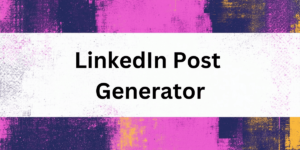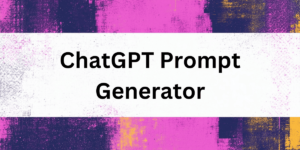Artificial intelligence (AI) is now a game-changer in the marketing industry, revolutionizing how businesses approach their marketing strategies. With AI marketing tools, companies can now access advanced technologies to enhance their marketing efforts, streamline processes, and drive better results.
The great thing about these tools is that they can analyze large amounts of data, generate personalized content, and make data-driven decisions, providing businesses with a competitive edge. In fact, a recent McKinsey report predicts a windfall for the global economy thanks to generative AI. This technology could inject between $2.6 trillion and $4.4 trillion annually, boosting productivity across 63 key use cases.
This article will explore generative AI in modern marketing and its various applications.
Let’s get started!
Unveiling the Role of Generative AI in Marketing
Generative AI is essential in marketing strategies. It enables businesses to leverage advanced technologies to gain a competitive advantage. As a marketer, AI lets you optimize your marketing efforts and enhance your customer experience.
According to Statista, in 2023, marketing professionals used generative artificial intelligence (AI) mostly for drafting content and creative efforts (52.5%), as well as ideation and brainstorming (48.5%).
Additionally, current marketing strategies must be data-driven and customer-centric. Generative AI integrates the power of machine learning and deep learning to analyze data and generate valuable insights, which is probably why 13% of marketers use it for ad personalization.
Once you understand customer preferences, behavior patterns, and trends, you can tailor your strategies to target the right audience with personalized messaging.
Some key advantages of generative AI in marketing are:
- Automating repetitive tasks and streamlining processes. This frees your time to focus on more strategic activities, such as developing creative campaigns and analyzing performance metrics. You can automate content creation, lead generation, and customer segmentation tasks.
- Continuously optimizing marketing campaigns. You can leverage real-time data and predictive analytics to make data-driven decisions. This agility and adaptability give you a competitive edge.
Defining Generative AI and Its Capabilities
Generative AI, a subfield of artificial intelligence, enables machines to generate content, analyze data, and make decisions. It utilizes advanced algorithms, including machine learning and deep learning, to process and understand complex patterns and generate meaningful outputs.
Machine learning, a subset of AI, helps machines learn from data. It involves training models on large datasets and using these models to make predictions or generate content.
Moreover, deep learning utilizes neural networks with multiple layers to process and understand complex data.
Generative AI combines machine learning and deep learning to generate content, analyze customer data, and optimize marketing strategies. It can generate personalized content based on customer interests and behavior, including social media posts, blog articles, and newsletters.
Additionally, it analyzes large amounts of data to identify trends, predict consumer behavior, and provide actionable insights for marketing strategies.
With its content generation, data analysis, and decision-making capabilities, generative AI empowers marketers to optimize their marketing activities, enhance customer experiences, and drive better results.
How Generative AI is Transforming Marketing Strategies
Generative AI transforms marketing strategies by revolutionizing various marketing activities and enhancing the customer experience.
Enhancing Creativity and Content Generation
Generative AI is revolutionizing creativity and content generation in marketing. Today, tools can automate generating content, saving marketers time and enhancing the quality of their marketing materials.
Here are some of the most relevant ways in which generative AI is enhancing creativity and content generation in marketing:
- Content generation. AI tools can automatically create content like logos, social media posts, graphics, articles, 3D objects, animations, and textures, or email newsletters based on predefined parameters and customer data. Tattoos.AI recently surveyed to see whether people could tell the difference between tattoos designed by AI and humans, and half couldn’t spot the difference!
- Personalized messaging. AI can analyze customer preferences and data to create customized messaging that resonates with individual customers, increasing engagement and conversion rates.
- Creative ideation. AI tools can provide marketers with creative ideas and suggestions for content topics, helping them overcome writer’s block and inspiring new and innovative marketing campaigns.
Personalizing Customer Experiences at Scale
Personalization is critical to creating memorable customer experiences and driving customer engagement. Generative AI lets you personalize customer experiences at scale by leveraging customer data and predictive analytics.
Generative AI tools can analyze vast customer data to identify patterns and trends, including demographics, browsing behavior, and purchase history.
Personalization at scale allows businesses to deliver targeted messaging and experiences to their customers, increasing the relevance and effectiveness of their marketing campaigns.
Real-world Applications of Generative AI in Marketing
Generative AI has demonstrated its value in real-world marketing applications, with businesses leveraging its capabilities to optimize marketing strategies, enhance campaign performance, and drive better results.
Here are some examples of real-world applications of generative AI in marketing:
- Case studies. Numerous brands have successfully incorporated generative AI into their marketing efforts, improving campaign performance, increasing conversion rates, and actionable insights. These case studies highlight the potential of generative AI in driving marketing success.
- Marketing tools. Generative AI tools have emerged, offering marketers advanced capabilities for automating tasks, generating content, and analyzing customer data. These tools give businesses the technology to leverage generative AI and enhance their marketing strategies.
- Campaign performance. Using generative AI for data analysis and predictive analytics, you can optimize your marketing campaigns, make data-driven decisions, and improve overall campaign performance.
Case Studies of Brands Successfully Leveraging AI
In 2024, many brands have integrated generative AI into their marketing efforts, showcasing its significant impact on campaign performance, conversion rates, and customer engagement.
Let’s go over some of the most notable case studies of large brands successfully leveraging AI in their marketing and product strategies:
Netflix
As a leading video streaming platform, Netflix uses machine learning and AI to personalize user recommendations from a catalog of more than 17,000 titles.
Netflix curates your homepage based on your viewing habits. Every thumbs-up, watch duration, and even whether you finish a show is analyzed by the algorithm, along with anonymized data from Netflix’s 223 million subscribers. This machine-learning magic helps predict your next favorite show.
Amazon
Amazon’s use of generative AI is evident in its recommendation engine. Amazon generates personalized product recommendations by analyzing user behavior and purchase history, resulting in higher conversion rates and increased sales.
Spotify

Spotify utilizes generative AI in more ways than one. First, to curate personalized playlists for its users.
The platform uses a powerful technique called reinforcement learning to constantly improve its recommendations. This AI learns from users’ behavior, like liking songs or saving playlists, and uses that information to suggest music they’ll love. The ultimate goal is to keep users hooked and coming back for more.
While Spotify keeps its exact methods under wraps, it’s clear its AI is designed to be your personal DJ, ensuring you never run out of new tunes to discover.
Innovative Campaigns Boosted by Generative AI
Generative AI has enabled marketers to develop innovative campaigns that leverage data-driven insights, personalized messaging, and enhanced brand awareness. Here are some examples of creative campaigns boosted by generative AI:
Nike
Nike’s ‘By You’ campaign uses AI-based personalization to help customers design their shoes. The system is comprised of two ‘layers’—Nike and You. Nike is black and white, with outlined type and components. The You layer is full of expression and creativity, working off the platform that Nike provides.
Users can click on Customize on Nike’s page and start creating the shoes of their dreams, either online or in-store. All they need to do is choose a standard model and customize it.
Virgin Voyages
Virgin Voyages set sail on a new wave of marketing with “Jen AI,” a revolutionary campaign starring Jennifer Lopez. This game-changer teamed Virgin Voyages with the creative agency VMLY&R and the AI startup Deeplocal.
Jen AI used cutting-edge technology to personalize cruise invitations for each viewer. Imagine JLo herself inviting you and your crew on a dream vacation tailored to your specific celebration.
This innovative blend of celebrity appeal and AI transformed personalized marketing, leaving competitors scrambling to catch up.
Nutella
Back in 2017, in a stroke of marketing genius, Nutella used an algorithm to design 7 million unique jar labels, each reflecting the vibrant spirit of Italian culture. This wasn’t just a cool gimmick; it showcased the power of AI to take product differentiation to a whole new level.
Customers were thrilled to find jars with one-of-a-kind designs, and social media buzz went into overdrive. The result? A surge in brand engagement for Nutella proves that AI can be a recipe for marketing success.
Enhancing User Engagement Through Generative AI
Generative AI has revolutionized the way businesses engage with their users, offering more interactive and personalized experiences. With generative AI, you can increase the time users spend on different channels by creating interactive content that captivates and engages users on websites and social media platforms.
Interactive content, like polls, quizzes, and videos, allows users to interact and engage with brands actively, resulting in higher engagement rates. This type of content not only entertains the users but also provides valuable insights into their interests and behaviors, which can be used to tailor future marketing campaigns.
Creating More Engaging and Relevant Ads
Generative AI has transformed how businesses create ads, enabling them to make more engaging and relevant content. With AI, marketers can deliver highly targeted advertisements that resonate with a certain audience, leading to higher engagement rates and improved conversion rates.
AI-powered algorithms can predict user behavior and preferences, enabling marketers to create ads tailored to specific customer segments, so that their ads reach the right people at the right time.
In addition to targeting, generative AI can also assist in ad creation. AI can generate personalized ad copies, headlines, and visuals that are more likely to capture the target audience’s attention. This level of personalization and relevance in advertising helps you stand out in a really crowded marketplace and maximize their marketing efforts.
Interactive and Personalized Email Marketing Campaigns
In 2024, email marketing is still a powerful way for brands to nurture customer engagement, and generative AI has made it even more effective. AI enables businesses to create interactive and personalized email marketing campaigns that really resonate with individual customers. While AI enhances email marketing, it’s also important to stay cautious of cyber threats—using a phishing link checker can help ensure your emails remain safe and trustworthy.
With the help of AI, you can analyze customer data to deliver highly personalized email content such as:
- Customized subject lines
- Dynamic content based on customer behavior
- Targeted offers or recommendations
- Interactive email elements, such as polls or quizzes
Generative AI has revolutionized email marketing by enabling marketers to create highly personalized and interactive campaigns that drive customer engagement and improve ROI.
Data and Personalization: The AI Advantage
Data fuels AI-powered marketing strategies, enabling businesses to personalize their marketing efforts and deliver tailored customer experiences. With the help of AI and data analytics, businesses can gain insights into customer behavior, purchasing patterns, and preferences.
For example, Mastercard’s Dynamic Yield tool uses artificial intelligence (AI) and machine learning to understand individual customer preferences and behaviors. Based on this analysis, it provides relevant suggestions and offers to increase customer engagement and conversions.
Leveraging Data for Hyper-Personalization
Hyper personalization is a marketing strategy that aims to create highly individualized experiences for each customer. With the help of generative AI and data collection, you can use customer data to deliver hyper-personalized marketing campaigns.
You can also deliver targeted content, product recommendations, and highly relevant offers to each customer’s needs and interests.
Predictive Analytics for Better Customer Insights
Predictive analytics is an AI tool that uses data analysis to forecast possible outcomes based on historical data. In the marketing context, predictive analytics helps you get insights into customer behavior and potential consequences of marketing campaigns.
With tools like these, you can predict customer preferences, purchasing patterns, and engagement levels by analyzing historical data and identifying patterns. This allows you to tailor your strategies to meet customer needs better and deliver more targeted campaigns.
Additionally, you can be proactive in marketing efforts and adapt your strategies to capitalize on new opportunities.
Overcoming Challenges in Implementing Generative AI
Implementing generative AI in marketing comes with its challenges, but the potential benefits outweigh the risks. Businesses must be aware of these challenges and take proactive steps to overcome them.
- One of the main challenges is the implementation process itself. You need to invest in the right AI tools, train your team, and ensure seamless implementation. This requires a clear understanding of the business goals, available resources, and the technical capabilities of the AI tools.
- Other potential risks associated with AI, such as data privacy and ethical considerations, are also challenges today. As a business, you must comply with data privacy laws and regulations and address ethical concerns about using AI in marketing.
Despite these challenges, the benefits of generative AI in marketing make it a worthwhile investment.
Ethical Considerations and Privacy Concerns
Using generative AI in marketing raises critical ethical considerations and privacy concerns that businesses need to address. As AI becomes more sophisticated, ensuring its ethical use and respect for customer privacy is essential.
One critical ethical consideration is the use of customer data. Businesses must be transparent about collecting, storing, and using customer data for AI-powered marketing strategies. They must obtain proper consent and ensure data privacy by complying with relevant privacy laws and regulations.
The Future of Marketing with Generative AI
The future of marketing with generative AI holds exciting possibilities and emerging trends that will reshape the marketing landscape. Here are some future predictions and trends to watch out for:
Increased Automation
Generative AI will continue to automate routine marketing tasks, freeing marketers to focus on strategic initiatives and creative aspects of their work.
Enhanced Personalization
AI will help businesses to deliver hyper-personalized experiences at scale, leveraging customer data and AI algorithms to create tailored marketing campaigns.
Voice and Visual Search
With voice assistants and visual search technology, businesses will need to optimize their marketing content for voice and visual queries and use AI to create engaging and relevant content.
Augmented Reality (AR) and Virtual Reality (VR)
AR and VR technologies are gaining popularity, and businesses will leverage generative AI to create immersive and interactive customer experiences.
Enhanced Customer Journey Mapping
Generative AI will help businesses understand and map the customer journey more effectively, allowing for targeted and personalized marketing efforts at each touchpoint.
Real-time Data Analysis
AI-powered analytics tools will enable businesses to analyze real-time customer data and make data-driven marketing decisions on the fly.
Enhanced customer support
AI-powered chatbots and virtual assistants like Zendezk and Intercom will continue to improve customer support by providing instant and personalized responses to inquiries.
Overall, the future of marketing with generative AI is bright, with emerging trends and advancements that will revolutionize how brands engage with their customers.
Emerging Trends and AI Predictions for the Next Decade
Looking ahead to the next decade, we can predict several emerging trends regarding the role of generative AI in marketing:
Emphasis on Ethics and Privacy
As AI becomes more pervasive, businesses will prioritize ethical considerations and data privacy, ensuring responsible AI usage in marketing strategies.
Integration with Emerging Technologies
Generative AI will integrate with emerging technologies, including augmented and virtual reality, to provide even more immersive and interactive marketing experiences.
Improved Customer Insights
AI-powered data analytics will give businesses deeper customer insights, enabling more accurate targeting and personalized marketing campaigns.
Wrap Up
In conclusion, generative AI revolutionizes modern marketing by enhancing creativity, personalizing customer experiences, and optimizing content strategies.
Brands leveraging AI have witnessed significant success through innovative campaigns and personalized digital interactions at scale. As we move forward, it’s essential to embrace the evolving landscape of AI in marketing, understand its capabilities, and overcome ethical and privacy challenges.
The future of marketing with generative AI holds tremendous potential, so keep exploring the endless possibilities of generative AI to push your marketing strategies to new heights.

Alina Midori Hernández
Journalist-turned-content writer at Envato. She’s passionate about design and the creative industry. She’s a metalhead, jazz enthusiast, and hardcore Tori Amos fan.
Read the Envato Blog.





























